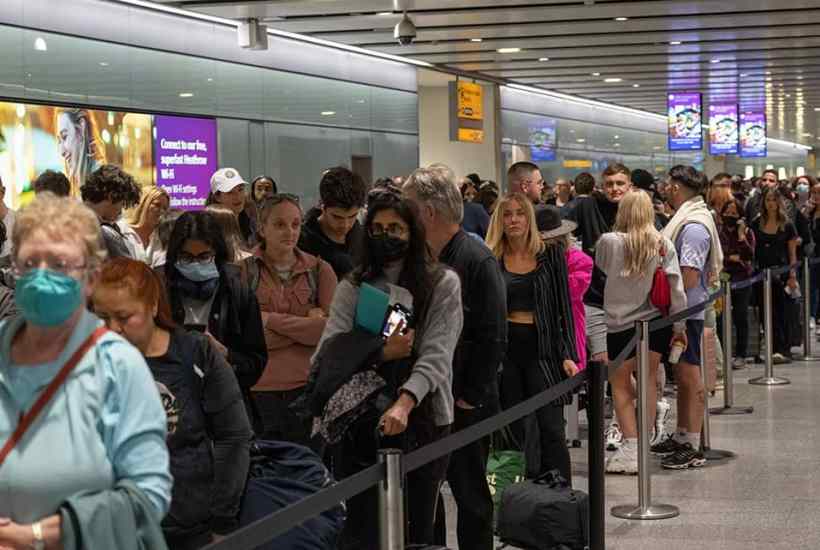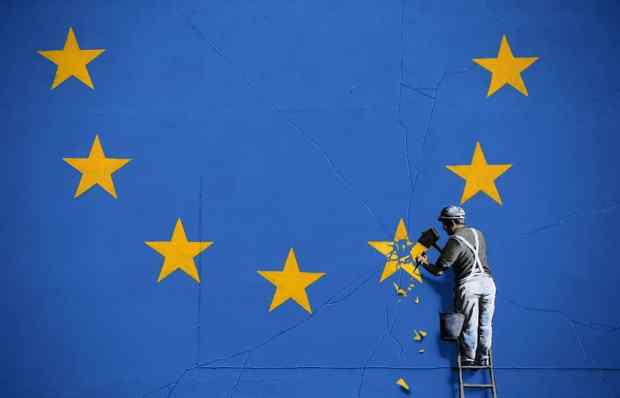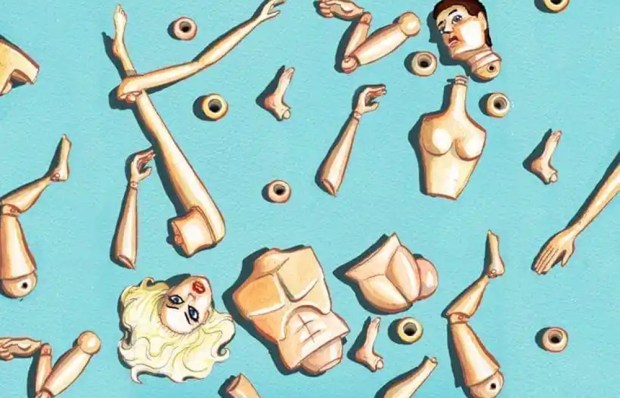If you have a flight booked in the next few months, it’s time to worry. A new era of air travel has arrived, in which reliability has been replaced with roulette. Airlines take bookings for flights they know might not take off. If staff shortages mean the flight is cancelled, passengers aren’t told until the last minute and are often denied compensation. And good luck finding a more reliable carrier. EasyJet, Wizz Air, British Airways: they’re all at it. Heathrow airport says the disruption may last until the end of next year.
There is no doubt that lockdowns were crippling for the air industry. Even when foreign travel was permitted again, it was under intimidating regulations. So-called ‘ghost flights’ – whereby airlines flew empty planes to keep their landing rights – became routine. But airlines made the travel crisis worse by demanding furlough money even after the scheme ended and then laying off staff, gambling that a fire-and-rehire strategy would save money overall.
There has been a political tug of war between the airlines and the unions. Both sides blame the government – and Brexit. In a meeting with Transport Secretary Grant Shapps, airline bosses demanded that immigration rules be relaxed for EU aviation workers. At one point, Michael O’Leary, the head of Ryanair, said the army should be sent in to fill job vacancies and get ‘rid of all these queues and flight delays almost in an instant’. Steve Heapy, the chief executive of Jet2, complained that ‘hundreds of thousands, if not millions’ of Europeans working in Britain have gone back home.
But is this really so? The numbers of workers from the EU did drop during the lockdowns but have since recovered. Almost one in five workers in the UK is an immigrant, an all-time high.
The point of Brexit was that tough, important jobs – such as baggage handling and border patrol – should pay a decent wage. This is a concept airlines and airports seem to be struggling with. At Stansted, an aviation services company is looking for ‘ramp and baggage’ agents for £10.84 an hour, not far above the £9.50 minimum wage. Jet2 is advertising for customer service staff at Bristol airport, offering just £22,000 a year for a job that doesn’t even come with guaranteed hours. Cabin crew start on as little as £15,000. If air stewards can earn more money working elsewhere, it’s little wonder that those who were laid off during the pandemic have chosen not to return to exhausting, low-paid jobs.
It was a mistake for airlines to sack so many people in the first place. Airlines were offered furlough, like all other employers in the country, but they wanted far wider and longer–lasting financial support. The government wouldn’t budge, asking why the average taxpayer – on a salary of £26,000 a year – should pay to subsidise an industry whose collective profits run into billions. Airlines were told they would be foolish to sack staff who might not come back.
But sack them they did. BA axed a quarter of its workforce; Virgin Atlantic, a third. Even now airlines have not acknowledged the disruption these decisions caused. In theory, airlines have an incentive to treat passengers well because they’re obliged to pay compensation. In practice, they try to wriggle out by misleading passengers about their eligibility for compensation with what seems to border on systematic deception.
One passenger to Portugal, who happens to be head of research at The Spectator, had his flight cancelled by BA. He was told that he was not entitled to a payout because he was offered an alternative flight the next day. He explained that this was quite untrue, quoting the relevant regulation (EC-261/2004) which mandates £220 payouts for short-haul flights that are cancelled at less than 14 days’ notice unless a replacement flight is quickly scheduled. Money must also be paid for substantially delayed flights. BA accepted his argument and he received his compensation. But how many passengers would have persisted?
More migration is unlikely to solve the problem, given that fire-and-rehire strategies have failed in Europe too. One day last month more than 1,000 passengers missed flights at Dublin airport due to staff shortages. Also last month, security queues at Amsterdam’s Schiphol airport spilled out into the carpark. French unions warn of long summer delays because a fifth of airport staff have left their jobs.
It is hard for an industry to go into hibernation and emerge intact. Airlines and airports deserve sympathy, but only up to a point. Air travel thrived under deregulation. When the Thatcher government opened the internal aviation network to competition, the way was cleared for easyJet and Ryanair and other pioneers of the low-fare flight revolution. These airlines owe their success to free enterprise. They should not come running to the taxpayer when times are hard.
Airlines must employ more staff, reflect upon the wisdom of fire-and-rehire tactics, and refrain from demanding more immigrant labour while baggage handlers are still being offered £10 an hour. Ministers should demand airlines publish figures on how many are entitled to and getting the £220-a-head compensation that is supposed to deter airlines from cowboy behaviour. Higher salaries may mean higher ticket prices, but what’s the value of a low-fare airline if passengers need to book a second, backup flight to be sure of getting away? Ministers must stand firm – and airlines should plot their own way to recovery.
Got something to add? Join the discussion and comment below.
Get 10 issues for just $10
Subscribe to The Spectator Australia today for the next 10 magazine issues, plus full online access, for just $10.
You might disagree with half of it, but you’ll enjoy reading all of it. Try your first month for free, then just $2 a week for the remainder of your first year.














Comments
Don't miss out
Join the conversation with other Spectator Australia readers. Subscribe to leave a comment.
SUBSCRIBEAlready a subscriber? Log in